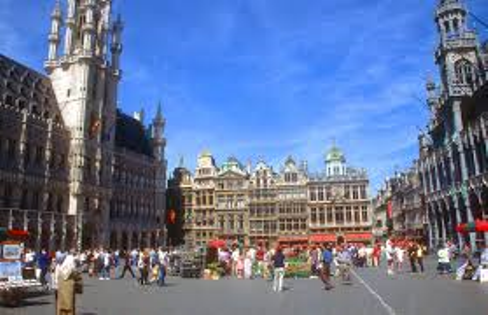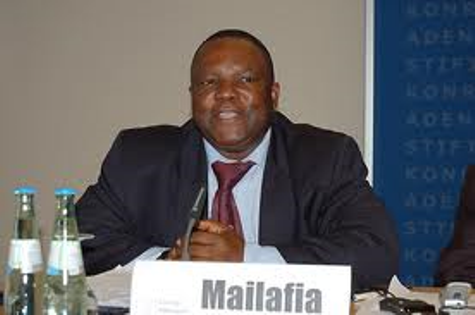OBADIAH MAILAFIA: STEADYING THE SHIP IN STORMY WATERS (II): ABSENCE OF LEADERSHIP, TODAY’S CHALLENGE OF THE WORLD ECONOMY

FEATURED IN JARUSHUB THOUGHT LEADERSHIP SERIES
By
Dr. Obadiah Mailafia
Chief of Staff of the Organisation of African, Caribbean & Pacific (ACP) of States, Brussels, Belgium
Former Deputy Governor, Central Bank of Nigeria
Being Text of a Lecture Delivered at the 11th Session of the National Economics Students Association (NESA) Conference at Obafemi Awolowo University, Ile-Ife, Nigeria
(12–13 March, 2014)
4. Thriving in Stormy Waters
We live in a rather turbulent global environment. There are some who look with nostalgia at the Cold War, because, at least, the so-called “balance of terror” between East and West ensured some form of equilibrium. The post-Cold War international is engendering new forms of instability and insecurity among nations and pupils.
The late Harvard political scientist Samuel Huntington spoke about “the clash of civilisations” as the defining character of twenty-first century international society. The attacks on the Twin Towers in New York in September 2001 were emblematic of the new disorder, with the emergence of al-Qaeda and other extremist movements committed to violence and fanaticism.
Globalisation is also one of the dominant realities of our emerging international economic system. Globalisation entails the internationalisation of world markets, production and capital. Market liberalisation has opened hitherto closed markets and has reduced the role of the state in the economy. The WTO liberal trading regime has given additional impetus to global trade through the removal of tariff and non-tariff barriers.
Within Africa, our regional economic communities are negotiating Economic Partnership Agreements (EPAs) with the European Union. Our own ECOWAS region is about to finalise its EPA negotiations with the Europeans. This would lead to significant reduction in tariff barriers. While competition from EU goods will intensify, the prospects of trade-creation are equally strong.
While opening up enormous opportunities for trade and wealth-creation, globalisation has also intensified global competitive pressures, particularly for developing countries. Inequalities are also deepening within and between countries, leading to new social and geopolitical tensions. Unchecked globalisation is also harming the environment and doing havoc to the biosphere which sustains all human and biological life on our planet.
One of the by-products of globalisation is the intensification of global turbulence. Because we live in an increasingly integrated global marketplace, the incidence of financial and economic volatility is higher, and with it the potential for negative contagion effect. For example, when the subprime crisis broke out in Wall Street, New York, in the autumn of 2008, the impact was immediately felt all across the world – Asia, Europe, Africa, the Middle East and Latin America. The price we have to pay for our emerging globalised economy is the reality of increased mutual vulnerability.
One of the paradoxes of globalisation is the increasing absence of leadership in the global economy. The theory of “Hegemonic Stability” in the field of international political economy is premised on the proposition that the leadership of a “hegemon” who is willing and able to underwrite the stability of the global economy is essential to maintaining the international equilibrium. Britain and sterling played that role for much of the nineteenth century.
The American public philosopher Walter Lippmann described the twentieth century as “the American Century”. American statesmen such as Woodrow Wilson and Franklin Roosevelt broke with their countries long tradition of isolationism and embraced the challenge of world leadership. America took a leadership role in the Bretton Woods negotiations that constructed the post-war international economic architecture. American leadership was decisive in the creation of the United Nations, and Eleanor Roosevelt, America’s First Lady, was one of the architects of the Universal Declaration of Human Rights.
For better or worse, my generation grew up in the shadow of the American Imperium. Sadly, we find an America that is gradually descending the spiral of terminal decline as prophesied by the historian Paul Kennedy. Having waged costly wars on two fronts in Afghanistan and Iraq; and having exhausted its financial and moral capital; America is, as it were, reaping the whirlwind. The USA is the most indebted nation on earth today, with a public deficit that currently stands at a staggering US$16 trillion.
The principal challenge confronting the world economy today is the absence of leadership. The Emergence of the new economic powers, Brazil, Russia, India, China and South Africa (BRICS) is one of the remarkable developments in international economic relations. It is now widely agreed that the centre of world economic gravity is shifting to Asia and the new economic powers. Europe and North America remain in recession while the prospects for the BRICS continue to be strong.
The rise of the BRICS also coincides with the erosion of the legitimacy of the Western-dominated Bretton Woods institutions, in particular the IMF and the World Bank. The BRICS have toyed with the idea of creating their own financial institution to rival the Washington multilateral finance institutions.
The world in which you will be pursuing your careers in the near future will largely be dominated by non-Western economic powers. By 2030, it is projected that Asia will be ahead of Europe and North America combined in terms of population and GDP. It is clear that the emergence of a multi-polar world requires sharing the burden of leadership if international order is to be restored in our world.
Another global trend of note is the dynamics of population. While Europe and North America are regressing in terms of population, the emerging countries are experiencing a population explosion. The world’s population has recently reached the 7 billion mark. It is projected to reach 8.3 billion by 2030.
Africa’s population currently stands at 1.1 billion, and is expected to exceed China and India by the year 2030. The continent has the world’s youngest population. The world’s middle class is projected to grow from 3.2 billion in 2020 to 4.9 billion in 2030. A recent report from the United States predicts that by 2050 Nigeria’s population will be about 440 million, way ahead of that of the United States.
Africa is currently experiencing the most rapid growth of the middle class as a percentage of the population. Globally, the middle class as a group will outnumber the poor – those characterised by the economist Paul Collier as “the bottom billion”. With a thriving middle class comes a mass consumer economy. This will provide opportunities for business, industry, agribusiness, banking and finance, infrastructures hotels, tourism and services.
Technology and scientific discovery is obviously another major force and driver of change in our contemporary world. The greatest centres of knowledge and scientific discovery are in Europe and North America. The world’s greatest universities are in the West. The Nobel Prize recipients in the sciences are still predominantly Westerners. The Fields Medal award, considered the Nobel Prize in the mathematical sciences, is dominated by a few countries, notably France, USA, Russia, Britain and Japan. African children score rather poorly on the world math and science Olympiads, although Nigerian pupils have acquitted themselves honourably in recent years.
British war-time Prime Minister, Sir Winston Churchill, once declared that “the empires of the future will be the empires of the mind”. Churchill meant that those who will command power and wealth in the future will be those who have mastery of science and innovation. Developments in new energy technologies, robotics, space science, nanotechnology and genetics will lead to profound changes in world economics and international relations. The lesson for our nations is that we will have to innovate or perish.
Another important global trend is the spread of democratisation around the world. The collapse of the Soviet Empire in 1989 and the spread of democracy in Eastern Europe opened up new vistas for Humanity. The totalitarian ideologies of the past have been discredited while democracy and the rule of law are now the accepted norms of the Global Standard of Civilisation. The American political thinker Francis Fukuyama coined the term “The End of History” to depict the spread of democracy and liberal market values across the world. My old teacher at Oxford, the late Sir Ralf Dahrendorf, termed it “the New Liberty”.
I am happy to note that Africa too is basking in the warmth of the New Liberty. Democracy and good governance are taking root and being consolidated in many of our countries. Africa has come a long way. Until recently, our continent was considered a basket case. Wars, conflict and famine engendered by oppressive government were the popular image of our benighted continent.
While it is true that many of these conflicts in Africa were fuelled by the struggle over natural resources such as diamonds and oil, they also have much to do with poverty and the structural violence occasioned by horizontal as well vertical inequities. Above all, they have to do with the lack of good economic and political governance and the absence of the minimum requisites of the rule of law and civil institutions needed to sustain economic development, democracy and social justice.
Living in Europe’s capital of Brussels, I can say with all confidence that a new and more positive image of Africa is gradually emerging. Significant strides are being made not only in economic growth but also in social development, democracy and governance. A new generation of Africans tempered by war, tutored in the crucible of manifold upheavals and wizened by extraordinary suffering are irreversibly committed to the ideals of freedom, democracy and the rule of law. This is not to say, of course, that such progress is not without its challenges. But the trends, in my view, are largely irreversible.
Continues tomorrow
Established in March 2013, JarusHub is a Nigerian information hub with focus on career and management. It is rated Nigeria's most authoritative destination for online career resources. It parades an array of Nigerian professionals who share their career experiences with a view to bridging career information gap and mentoring a generation to success. JarusHub has revolutionised career information and experience sharing in Africa. Whether you're a student, a recent graduate or an established professional, or even an executive, you will always find something to learn on JarusHub. All enquiries to jarushub@gmail.com or 0808 540 4500. Facebook: www.facebook.com/jarushub; Twitter: @jarushub or @mcjarus.
Attend JarusHub’s 2024 Seplat Assessment Center Coaching
October 29, 2024
Let us have your say by leaving a comment belowCancel reply
Recommended For You
-
CHEMICAL ENGINEERING OR CIVIL ENGINEERING?
December 25, 2015 -
Key Tips to Pass a Corporate Interview
April 7, 2017 -
Do Lawyers Work in the Oil and Gas Industry?
December 5, 2020










